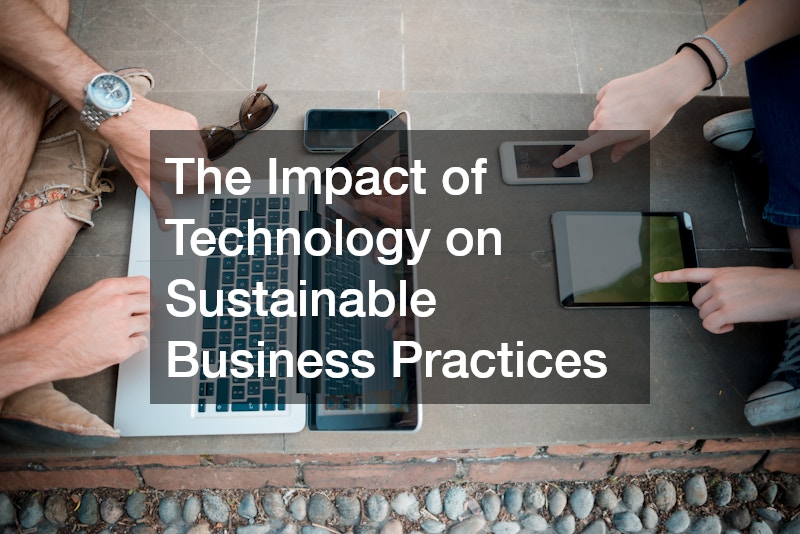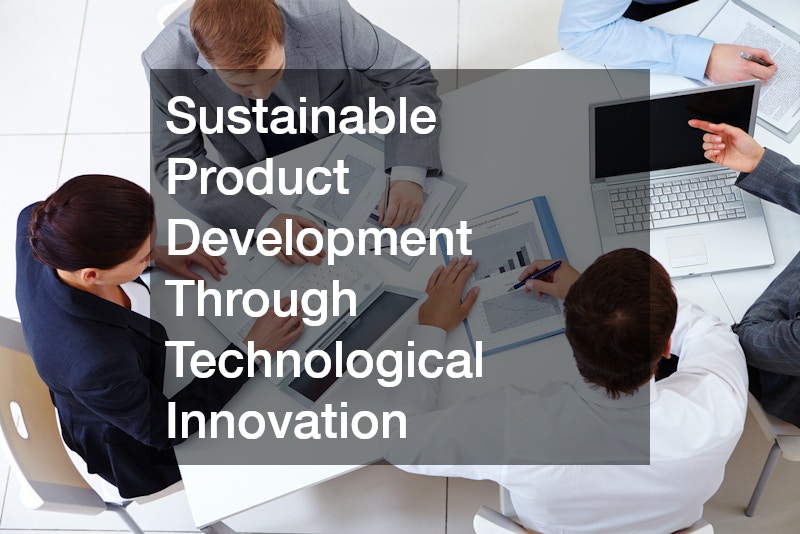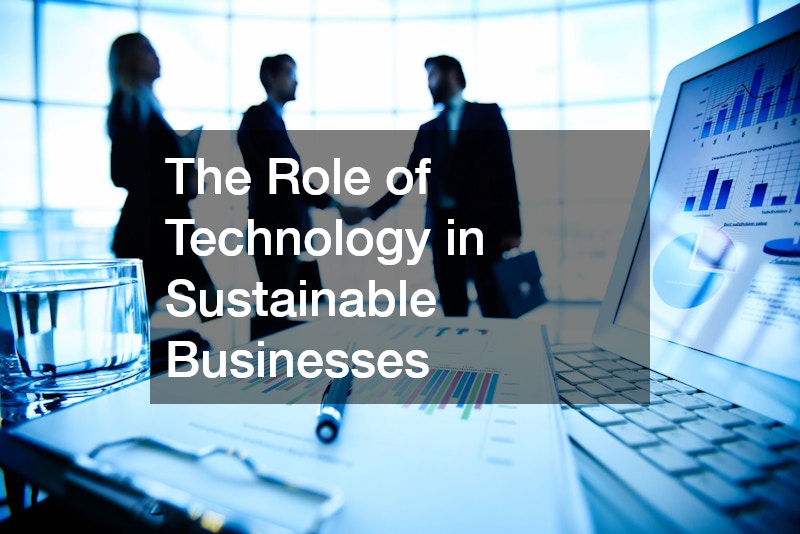Evaluating the Role of Technology
The role of technology in modern business is undeniably transformative, particularly in the pursuit of sustainability. With increasing concerns over climate change and environmental degradation, companies are adopting innovative technologies to minimize their ecological footprint while optimizing efficiency. These advancements not only help businesses reduce their environmental impact but also pave the way for new, sustainable practices that align with evolving consumer demands and regulatory requirements. Whether it’s automation, data analytics, or AI-driven systems, technology is now at the heart of sustainable business strategies, enabling companies to manage resources more responsibly, cut emissions, and improve transparency.

The Impact of Technology on Sustainable Business Practices
Technology plays a pivotal role in fostering sustainable business practices, particularly in industries that traditionally have a significant environmental impact. By integrating eco-friendly technologies, businesses can adopt methods that reduce waste, conserve energy, and minimize their carbon footprints. Sustainable technology solutions, such as advanced monitoring systems, can track energy consumption and emissions, allowing businesses to implement more efficient processes. The role of technology in sustainability goes beyond environmental benefits—it also enhances operational efficiency, improves stakeholder trust, and aligns businesses with evolving regulatory standards aimed at reducing ecological harm.
For a cesspool pumping business, embracing technology can significantly reduce environmental risks. Advanced pumping and filtration systems help to ensure waste is processed more efficiently, preventing contamination of local water supplies and ecosystems. These technologies not only enhance the sustainability of the business but also improve service quality by reducing operational downtime and minimizing the need for energy-intensive equipment.
Advancing Energy Efficiency Through Innovative Technologies
In the quest for sustainability, energy efficiency is a primary focus for many businesses, and innovative technologies have made significant advancements in this area. The role of technology in improving energy efficiency is evident in the development of smart systems, renewable energy solutions, and data-driven energy management tools. These technologies allow businesses to monitor their energy consumption in real-time, make necessary adjustments, and ultimately reduce both their costs and environmental impact. Additionally, innovations like energy-efficient machinery and building management systems are helping companies reduce emissions and align with sustainability initiatives.
For the business coaching industry, integrating energy-efficient technologies into daily operations can have a profound impact. Business coaches can guide organizations in adopting digital platforms and tools that streamline operations while minimizing energy use. For instance, virtual coaching sessions eliminate the need for travel, cutting down on emissions and energy consumption. By highlighting the role of technology in energy efficiency, business coaches can empower companies to not only improve their bottom line but also contribute to a more sustainable future.

How Digital Solutions Support Sustainable Supply Chains
Digital solutions are transforming supply chains, making them more efficient and sustainable. The role of technology in supply chain management includes innovations such as blockchain, AI, and IoT, which improve transparency, reduce waste, and optimize resource use. These tools help businesses track every stage of the supply chain, from raw materials to delivery, ensuring that sustainable practices are followed throughout. Furthermore, automation and real-time data analytics enable businesses to respond to supply chain disruptions quickly, reducing delays and minimizing environmental impact. By streamlining operations and cutting inefficiencies, technology plays a critical role in building sustainable supply chains.
For a commercial concrete business, these digital solutions are crucial in creating a more environmentally responsible supply chain. With tools like digital inventory tracking and automated ordering systems, businesses can reduce overproduction, cut down on material waste, and ensure that sustainable sourcing is prioritized. Additionally, IoT-enabled devices can monitor concrete curing processes, helping to reduce energy use and emissions during production.
The Role of Automation in Reducing Environmental Footprints
Automation has become a driving force in reducing the environmental footprints of various industries. The role of technology in automating business processes has led to significant reductions in energy use, waste production, and resource consumption. Automated systems streamline tasks that would typically require more time and energy, allowing businesses to operate more efficiently and with less environmental impact. Additionally, automation enhances accuracy in resource management, reducing the likelihood of overuse or unnecessary waste. As businesses continue to adopt automated technologies, their ability to reduce their environmental footprint grows, contributing to long-term sustainability goals.
In a stucco remediation company, automation can revolutionize both the efficiency and environmental impact of operations. Automated mixing systems, for example, ensure that materials are used precisely, minimizing waste. Additionally, automated scheduling and project management tools reduce travel and unnecessary site visits, which helps lower emissions from transportation. By incorporating automation into their processes, a stucco remediation company can not only cut operational costs but also reduce its carbon footprint, showcasing the essential role of technology in fostering sustainability within the construction and building repair industry.

Leveraging Data Analytics for Sustainable Business Growth
Data analytics is one of the most powerful tools for driving sustainable business growth. The role of technology in data analytics allows companies to gather, interpret, and act on real-time data to make informed decisions that support sustainability goals. By analyzing data on energy use, resource consumption, and waste management, businesses can identify areas where improvements can be made, and inefficiencies can be reduced. Additionally, predictive analytics can help businesses forecast demand, allowing them to adjust production and reduce overuse of resources. The ability to harness and analyze data is crucial in making business operations more environmentally friendly and resource-efficient.
For a sandblasting business, data analytics can provide valuable insights into operational efficiency and environmental impact. By monitoring energy use and materials consumption during sandblasting projects, businesses can identify opportunities to reduce waste and improve efficiency. Furthermore, data analytics can help track equipment performance, ensuring that machinery is operating at optimal levels to minimize energy use and emissions. Through the role of technology in data analytics, a sandblasting business can make informed decisions that support sustainable growth, reducing its environmental footprint while enhancing profitability and service quality.
Cloud Computing and Its Contributions to Sustainability
Cloud computing has emerged as a significant player in enhancing sustainability across various industries. The role of technology in cloud computing offers businesses the ability to reduce their physical infrastructure needs, lower energy consumption, and streamline operations. By storing data in the cloud, businesses can minimize the need for energy-intensive on-site servers, significantly cutting down their carbon footprint. Additionally, cloud-based collaboration tools allow for remote work, reducing the need for commuting and travel, which further contributes to sustainability. Cloud computing also improves scalability and resource management, allowing businesses to adjust their IT needs dynamically, avoiding the waste of excess resources.
For an outdoor kitchen company, cloud computing can streamline project management and client interactions, leading to more sustainable business practices. By utilizing cloud-based design tools, the company can reduce the need for printed plans and in-person consultations, saving energy and materials. Moreover, cloud storage ensures that all project data is accessible in real-time, enhancing communication and reducing construction delays. With the role of technology at the forefront, outdoor kitchen companies can operate more efficiently, reduce their environmental impact, and promote a sustainable business model that aligns with modern environmental standards.
The Influence of AI on Sustainable Resource Management
Artificial intelligence (AI) is playing a transformative role in managing resources more sustainably. AI’s ability to analyze data, make real-time decisions, and predict future trends helps businesses optimize their resource use and minimize waste. The role of technology in AI-driven systems is particularly impactful in industries that rely heavily on resource management, as AI can monitor usage patterns, predict demand, and adjust resource allocation accordingly. This reduces unnecessary consumption and enhances operational efficiency. By implementing AI solutions, businesses can ensure they are using resources in the most environmentally responsible way possible, contributing to overall sustainability efforts.
For plumbing contractors, AI can revolutionize how water resources are managed. AI systems can detect leaks, monitor water flow, and predict maintenance needs, preventing water waste and reducing energy consumption associated with pumping and heating water. These AI-driven solutions allow plumbing contractors to offer more sustainable services to clients, ensuring that water conservation is a priority. With AI playing a critical role in resource management, plumbing contractors can embrace more eco-friendly practices, reducing their environmental footprint while improving efficiency and client satisfaction. This demonstrates the essential role of technology in driving sustainability within the plumbing industry.

Sustainable Product Development Through Technological Innovation
Technological innovation is at the heart of sustainable product development, enabling businesses to create eco-friendly products with reduced environmental impact. The role of technology in this area includes advancements in materials science, energy-efficient manufacturing processes, and digital design tools that reduce waste and resource consumption. Sustainable product development is not only about creating greener products but also about ensuring that the entire lifecycle—from production to disposal—minimizes environmental harm. Businesses that invest in technological innovation are better equipped to meet growing consumer demand for sustainable products while maintaining profitability.
For roofing contractors, sustainable product development is key to reducing the environmental impact of roofing materials. Innovations such as solar-integrated shingles, recyclable roofing materials, and energy-efficient insulation are just a few examples of how technology is driving eco-friendly roofing solutions. By adopting these sustainable products, roofing contractors can offer clients environmentally responsible options that reduce energy consumption and enhance building sustainability. The role of technology in product development ensures that roofing contractors can meet both the practical and environmental needs of their customers, contributing to a more sustainable construction industry.
Enhancing Corporate Sustainability with IoT Technologies
The Internet of Things (IoT) is rapidly becoming a critical component in enhancing corporate sustainability. The role of technology in IoT allows businesses to connect devices, machinery, and systems to gather and analyze real-time data, leading to better resource management and more efficient operations. IoT technology can monitor energy usage, detect equipment inefficiencies, and automate maintenance tasks, reducing both downtime and unnecessary energy consumption. By enabling smarter, data-driven decisions, IoT helps businesses optimize their resource use, cut costs, and lower their carbon footprints, contributing to their overall sustainability goals.
For a forklift repair company, IoT technologies can transform how equipment is monitored and maintained. Sensors attached to forklifts can track performance, energy use, and potential maintenance needs, allowing repairs to be conducted before costly breakdowns occur. This proactive approach not only extends the life of the forklifts but also reduces energy waste associated with inefficient machinery. Through the role of technology in IoT, forklift repair companies can offer more sustainable services to clients by ensuring that their operations are optimized for both cost savings and environmental responsibility.
The Future of Sustainable Businesses in the Age of Technology
As the world moves towards more sustainable practices, the role of technology will continue to shape the future of businesses, particularly in industries known for their environmental impact. Technological advancements in automation, resource management, and sustainable product development are helping businesses reduce their ecological footprints while maintaining operational efficiency. The integration of new technologies not only supports current sustainability initiatives but also ensures that businesses are prepared for future challenges and regulations regarding environmental responsibility. As innovation progresses, businesses that adopt these sustainable technologies will lead the way in promoting a more environmentally conscious global economy.
In the demolition industry, the adoption of technology is crucial for minimizing environmental harm. Advanced machinery, such as precision-controlled demolition equipment, can reduce waste and increase the efficiency of material reuse and recycling. Additionally, digital tools allow a demolition company to plan projects more effectively, ensuring that environmental impacts are mitigated through careful waste management. By embracing the role of technology, demolition companies can align with sustainability goals while maintaining the efficiency and effectiveness of their operations, ensuring a greener future for the industry.
Incorporating New Technological Changes
The role of technology in fostering sustainable business practices is undeniable. Across industries, from manufacturing to service-based businesses, technological advancements are enabling companies to operate more efficiently, reduce waste, and minimize their environmental impact. Whether through automation, AI, data analytics, or IoT, technology is providing the tools necessary for businesses to adopt sustainable practices that benefit both the environment and their bottom line. As sustainability becomes an increasingly important factor in consumer and regulatory demands, businesses that embrace these technologies will not only meet these expectations but will also be better positioned for long-term success.
